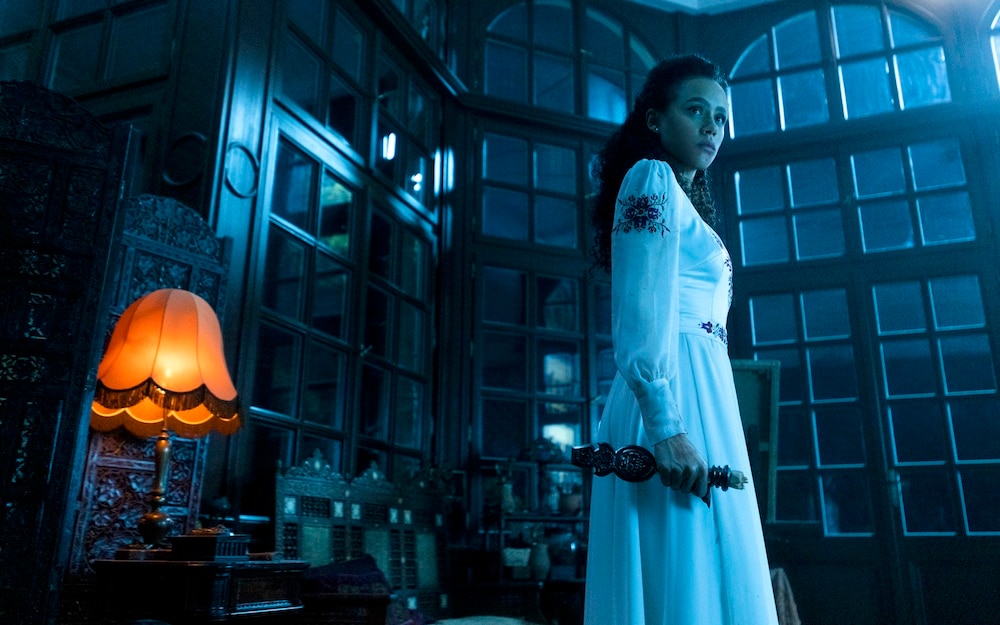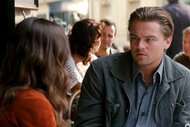Create a free profile to get unlimited access to exclusive videos, sweepstakes, and more!
'The Invitation' is a romance-horror 'origin story for the Brides of Dracula,' director says
Nathalie Emmanuel's new movie puts an interesting, class-based spin on the well-known vampire mythos.

It’s hard to reinvent the vampire movie. The upcoming horror flick The Invitation doesn’t set out to do that, not exactly, but it does manage to find a fresh new angle that it can sink its fangs into. First, the movie really forefronts the class aspect that’s lurking in most vampire movies. And, second, it presents a unique vampire mythology that puts the focus not on a Dracula-like figure, but on his wives — or would-be wives.
“What immediately drew me to the script was that it was an origin story for The Brides of Dracula, which I really felt like I hadn’t seen before, and I don’t think that there is one out there, to my knowledge,” Director Jessica Thomas tells SYFY WIRE ahead of The Invitation’s Aug. 26 premiere.
The Invitation stars Game of Thrones’s Nathalie Emmanuel as Evie, a cater-waiter living in New York City who is still getting over the recent death of her mother. When she takes a 23andMe-like test on a whim, she learns that she actually is related to a long-lost Cousin Oliver, an extremely posh, extremely wealthy, and extremely British man. When they have a family reunion over lunch, Oliver invites Evie to a family friend’s wedding in the English countryside. Upon getting there, Evie soon meets — and hits it off with — the lord of the manner, the dashing and supernaturally alluring Walter, played by Thomas Doherty. It seems like a meet-cute out of a rom-com, but it’s not too long before Evie discovers that something evil is happening, and these wedding attendees have plans for her.
That Evie and Walter have good chemistry and a believable relationship is important to what makes The Invitation work, as both Thomas and the stars agree.
“I felt like it was this contemporary gothic film that had this mash of two genres — this romance and this horror,” Thomas says. “We actually care about the relationships and we want them to succeed. Of course, then, things go awry.”
“She’s going to this house that’s this very wealthy aristocracy,” Emmanuel says. “You would expect a much older man who is very wealthy and powerful, but instead it’s this kind of young, attractive charming man who is sort of poking fun at her in a cute way.”
“There’s a spark,” Doherty adds.
Ensuring that the first part of the movie — the part before everything turns terrifying — lived up to all the tropes of the romance genre while still making it of a piece with the horror to come, was a big concern for Thomas, her cinematographer, and her production designer. “‘This is the fairytale version, this is the nightmare version.’ We had different lighting schemes and lenses, different looks, that we would use for both of those,” she explains.
That extended to musical cues, too. When Evie first arrives, we hear romantic themes. When the twist comes, those same themes are heard again, but reversed. “Those are just some of the things we did to distinguish the two worlds and then blend them together,” Thomas says.
The exact nature of the twist shouldn’t be spoiled, but it’s fair to say that, even as the first half of the movie plays by many of the romance genre beats, there are still lots of scary human moments. When Evie gets to the estate, she’s at first mistaken for the help. (There are working-class maids and servers who have been employed for this aristocratic wedding, and things don’t go especially well for them.) At the onset, Evie is sympathetic to the workers and feels out of place among her newfound rich white family members.
“Evie probably relates to those characters and those women more than she does Walt and her family because she’s the wait staff,” Emmanuel says. “She’s a person with no money. She’s a person of color. She’s usually fighting for her place in the world.”
“Historically, women of color have been the most disenfranchised by the white world order,” says Thompson. “She’s got further to climb — further to fight.”
“Dracula, to me, represents the old world order. The patriarchy. He’s uplifted these people who are basically at his beck and will. He’s paying them off. This is exactly how corporate greed works,” Thompson continues, explaining that she enjoys horror movies that have some social commentary in them. “What I love about Evie’s character is that she’s this young heroic woman who stands up to that and doesn’t lose sight of who she is in the face of evil.”
The Invitation opens in theaters on Aug. 26.
Looking for more blood-sucking action? Check out Vampire Academy when the new series premieres on Peacock on Sept. 15.


























